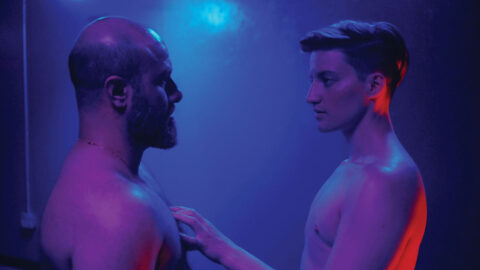Connecting the first images of transmasculine intimacy in bathroom saunas and hotel rooms in Jules Rosskam’s Sundance-entry Desire Lines (2024) — playing in NEXT — with recent anti-trans legislation in wider Utah is inevitable.
Last January, Utah’s state government banned gender-affirming care for trans youth. A few days ago, HB257 was passed in Utah’s house, which will enforce trans and non-binary people to use bathrooms of the gender they were assigned at birth. Austin Vinas’s smooth steadycam prompts audiences that trans visibility doesn’t conflate trans safety and that trans bodies are here to be loved and accepted in public and private spaces.
Ahmad (Aden Hakimi), a trans Iranian, visits the hotel and their LGBTQI+ archive to look into the history of trans men. In his excavations, we see interviews of trans men explaining people’s stereotypes, their feelings within different LGBTQI+ subcultures and their experiences before their transition and as eggs (a slang term for trans people who don’t know they’re trans yet). He is frequently assisted by archivist Kieran (Theo Germaine), who shares with him the significance of Lou Sullivan, the first known trans man, and other lesser-known artefacts of trans culture.
Like Chase Joynt’s Framing Agnes (2022) and Paul B. Preciado’s Orlando, My Political Biography (2023), Desire Lines bridges written accounts of trans lives with scripted scenes. Rosskam (also an academic) employs testimonials and fiction to enhance deep desires for self-love and seeking community. He intersects academia and the arts in their relation to performance and how scientists — mostly white cishets – observed trans people. Here he confronts the limits of the “ethnographic” label and paints a portrait of living, Rosskam fusing life into a biographical description of his cast.
Despite the on-par acting from Germaine and Hakimi’s embodiments of obtaining meaning, the inorganic dialogue razes the characters’ interiority. Kieran needs to be more explicit about why he is heavily interested in Ahmad; his words are delivered like a non-playable character from a video game. Yet, a trembling force in the eerie sci-fi sound design within the film’s underground-esque settings arrives. It makes viewers appreciate the precarity in finding one’s existence and gives them goosebumps when recollecting their past inflictions.
Rosskam’s instinctual direction welcomes grief, sorrow, and joy in this unconventional time-traveling tale. He reminds us that time is not linear and that going to the past can happen in one moment. Characters embrace kinship and camaraderie when it is needed. He gives the forgotten home and liberation from atrocity.

Edward Frumkin is a Brooklyn-based critic.

